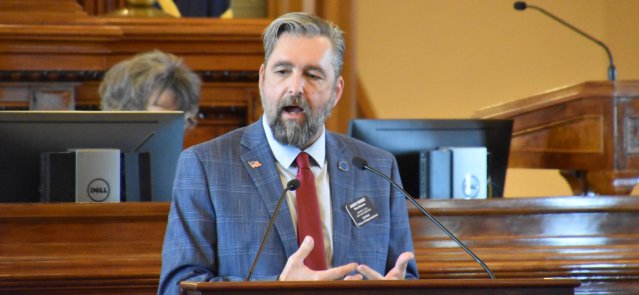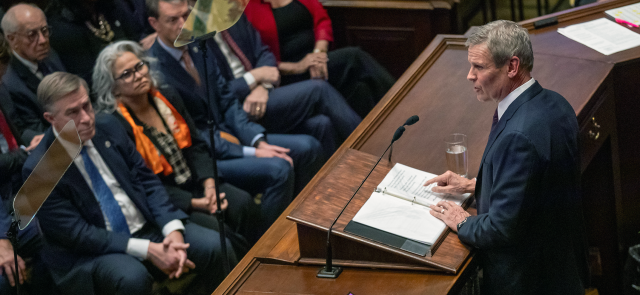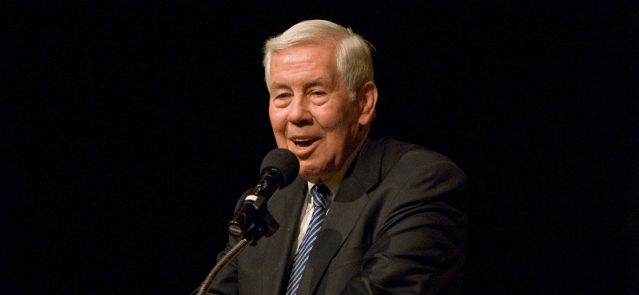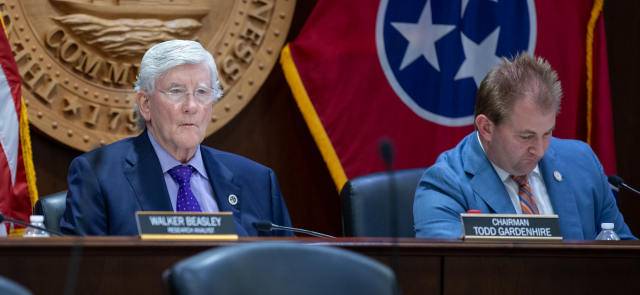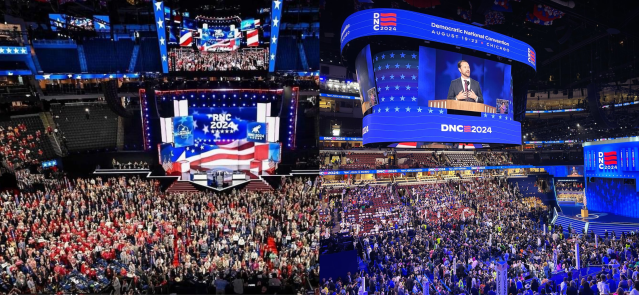Two searing moments or sequences stood out at the Republican and Democratic national conventions.
As Donald J. Trump took the RNC stage in Milwaukee for his third nomination acceptance speech in mid-July, James Brown’s 1966 song “It’s Man’s Man’s Man’s World” was his entrance soundtrack. It came a few minutes after Hulk Hogan tore his shirt off in a testosterone-tinged sequence.
Last week, DNC viewers saw an array of potent female speakers, such as Michelle Obama (“Who’s gonna tell him the job he’s campaigning for is one of those Black jobs?”), Gabby Giffords (“I’ve got grit!”), Hillary Clinton (“The future is here”), Nancy Pelosi (“You have to make the decision to win”) and the presidential nominee (“I’m Kamala Harris, for the people”).
But it would be two former Hoosiers, Josh and Amanda Zurawski, who framed what could be the issue — reproductive rights — that supercharges the November election.
“I was punished for three days because I had to wait for either my baby to die, or me to die, or both,” Amanda Zurowski told the United Center audience on Aug. 19 of her experiences with Texas’ total abortion ban. “I was stuck in this horrific hell of wanting to hear her heartbeat and also hoping I wouldn’t. I almost died because doctors were forced to follow Donald Trump’s abortion ban. Every time I share this story my heart breaks. But I was lucky. I lived. I will continue to share my story. We need to vote as if lives depend on it because they do.”
Ten states will have abortion referendums on the ballot in November, and three of them — Arizona, Nevada and potentially Florida — could be considered swing states. Nebraska (which votes Electoral College via congressional district) has two citizen-initiated ballot questions that back or negate abortion rights.
After watching abortion referendums that preserve reproductive rights pass in ruby-red states like Ohio, Kentucky and Kansas, it’s clear this is an issue that could spur female voter turnout.
Watching the Trump campaign respond to this issue has been fascinating. The campaign’s decision to remove the issue from the GOP platform in July, and Trump’s comments about letting the states hash it out, has become a huge issue shift.
In April, Trump released two videos on the issue. “We brought it back to the states, and now lots of things are happening, and lots of good things are happening,”Trump said in one video. In another, he accused Democrats of trying to distract from immigration and the economy.
“The only issue they think they have is on abortion, and now all I say is the states are handling it and it’s totally killed that issue,” he said.
NBC’s Natasha Korecki and Adam Edelman observed in April: “Trump’s dizzying stances on abortion this week — on Monday embracing states’ rights and on Wednesday distancing himself from a state-based outcome — demonstrate the messaging impossibilities that are ahead for him as he moves into the general election and tries to shed the impact of Roe v. Wade’s fall.”
Peter Wehner, who served in the Reagan/Bush administrations, said in a column in The Atlantic this week that “pro-life justification for supporting the former president has now collapsed.”
Wehner wrote, “Trump has done what no Democrat — not Bill or Hillary Clinton, not Mario Cuomo or John Kerry, not Joe Biden or Barack Obama, not any Democrat — could have done. He has, at the national level, made the Republican Party de facto pro-choice. Having stripped the pro-life plank from the GOP platform, having said that Gov. Ron DeSantis’s ban on abortion after six weeks is ‘too harsh’ and a ‘terrible mistake,’ and having promised to veto a national abortion ban, Trump has now gone one step further, essentially advocating for greater access to abortion.”
Wehner told MSNBC’s “Morning Joe” Wednesday that he doesn’t believe Trump will lose much evangelical support, saying they’ve essentially become part of his cult no matter how he shifts on their most important issue. “Trump’s imprint on the party is profound,” Wehner said.
What happens on the Democratic side is where this election could be won or lost. Elaine Kamarck wrote for the Brookings Institution: “The expectation is that at least some, if not most, of the pro-choice voters likely to be mobilized by the abortion issue will help Democrats up and down the ballot. As a result, Democratic campaigns are working hard to make sure the public knows that Republicans are responsible.”
Marc Caputo of The Bulwark raised the question of whether Trump will reveal how he will vote on the Florida initiative that would restore abortion rights. Caputo quoted one anti-abortion activist: “If he said nothing about abortion from now until Election Day, it wouldn’t bother me simply because we do know where he stands.”
“This is the first presidential election where abortion will be front and center,” Republican strategist Alex Conant told NBC News. “This is just not an issue where Republicans are likely to win.”
That could be a pivotal element. At this writing, the presidential race is a toss-up. In the FiveThirtyEight polling composite, Kamala Harris has a 47.1% to 43.6% national polling edge over Trump. In the RealClearPolitics polling composite, Harris has a 1.7% lead over Trump, 48.3% to 46.6%.
But Trump has fingernail swing state polling leads in Pennsylvania (by 0.2%), Arizona (0.5%), Nevada (1.4%) and Georgia (1.0%).
A Fairleigh Dickinson University poll released Aug. 23 found Harris leading Trump 50% to 43% nationally. Trump saw his strongest support among men “who hold traditionally masculine identities,” while women and other men who reject those identities favor Harris, according to the pollsters.
“Trump has built his political career around a very specific performance of whiteness and masculinity,” Dan Cassino, a professor of government and politics at Fairleigh Dickinson and the executive director of the poll, said in a release. “In the past, that’s been seen as a strength, but it’s no longer clear that it’s working.”
The movement is heading toward Harris. On July 21 (the day President Biden ended his reelection bid), Trump had a 3.1% lead, 47.9% to 44.8%, over Biden. The RealClearPolitics polling now has Harris leading Trump by 1.7%. That’s almost a 5% swing. Most post-DNC polls are expected to be released later this week. A further polling bump for Harris would not be surprising.
Before her meteoric ascension to the Democratic nomination, Harris had been the Biden administration’s point person on the abortion issue.
This all sets up a crucial debate for Sept. 10 on ABC.
Another attention-grabbing element is party unity. The DNC featured every living presidential nominee with the exception of 99-year-old President Jimmy Carter. The RNC had none of its past standard-bearers or vice presidents in attendance.
Though Trump is expected to carry Indiana easily in November, Hoosier Republicans are divided.
Indiana Republicans who have endorsed Donald Trump:
Indiana Republicans who haven’t endorsed Trump:
- Gov. Eric Holcomb
- U.S. Sen. Todd Young
- U.S. Rep. Larry Bucshon
- Mike Pence
- Karen Pence
- Marc Short
- Dan Coats
- Marsha Coats
- Seema Verma
- Dr. Jerome Adams
- Alex Azar
- U.S. Rep. Greg Pence
- Susan Brooks
- Jefferson Shreve
- Peter J. Rusthoven
- Alyssa Farah Griffin
- Miles Taylor
- Olivia Troye
In 2016, Trump won the Indiana primary with 53% of the vote with virtually no GOP establishment support.
This year, most Hoosier Trump supporters have run or are running for office, including past and current gubernatorial candidates as well as new nominees in the 1st, 3rd and 8th congressional districts.
The list of those not endorsing Trump includes not only the sitting governor and senior senator but also a number of Hoosiers who served in the Trump cabinet and administration, including Vice President Pence, Director of National Security Coats, Health and Human Services Secretary Azar, Medicaid/Medicare Commissioner Verma and former Pence aides Short, Troye and Griffin.
Rusthoven was a 1998 Republican Senate candidate who served in the White House under President Reagan. Taylor is from LaPorte and wrote the so-called anonymous New York Times op-ed early in Trump’s term on resistance to his rule inside the administration.
With the exception of Rusthoven, Griffin and Troye, most Hoosiers on this list have not endorsed Harris.
Harris introduces herself at DNC
After a head-spinning month and a day that has completely transformed the presidential race, Harris became just the second offspring of American immigrants to claim a major party nomination Thursday night.
“I see an America where we hold fast to the fearless belief that built our nation and inspired the world,” Harris said at the United Center less than five weeks after President Biden folded his reelection bid and then gave her his explicit imprimatur. That allowed the Democratic National Convention to unite behind the vice president as opposed to a chaotic, multi-ballot nomination floor fight.
“That here, in this country, anything is possible,” Harris continued. “That nothing is out of reach. An America where we care for one another, look out for one another and recognize that we have so much more in common than what separates us. That none of us — none of us has to fail for all of us to succeed.
“And that in unity, there is strength,” said Harris, who emerged from this four-day confab with an overtly unified party. “You know, our opponents in this race are out there every day denigrating America, talking about how terrible everything is. Well, my mother had another lesson she used to teach: Never let anyone tell you who you are. You show them who you are.”
Democrats spent four days co-opting the concepts of “freedom” and “democracy.” They presented themselves as defenders of the military and cops. They made overt appeals to independents, moderates and even Republicans.
Trump reacted to Harris’ final DNC speech, telling Fox News on Aug. 22: “We’re doing very well in the polls. She’s not having success. I’m having success. I’m doing great with Hispanic voters. I’m doing great with Black men. I’m doing great with women, because women want safety.”
Hoosier Republicans react
A former rural Indiana county Republican chairman who has voted for Trump twice told Howey Politics Indiana/State Affairs regarding Harris: “She’s trying to hide [the fact that] she wants to raise taxes to cover $1.2 trillion of new spending. However, I think she will prevail. Trump is off script and kinda flailing around, which is not a good look.”
A Hoosier Republican nursing home executive who is also in the “never Trump” camp told Howey Politics Indiana/State Affairs: “I don’t like the policies that she has talked about with taxes and price controls. I like many of her cultural approaches. I really don’t like the concept of a very liberal Democrat being president, and there is no way in the past I would have supported her. But like many Republicans have said, the right policies are not my concern right now. Gotta take down Trump.”
DNC takeaways
Best speeches in this order:
- Michelle Obama (outstanding)
- Adam Kinzinger (an important appeal to Haley/moderate GOP/GOP-leaning Independents)
- Harris (a well-delivered, artfully crafted speech that was both base-pleasing and attractive to moderates)
The GOP opened a wide playing field for Democrats, who quickly claimed the field:
- Democrats are the party that fights communism. The Trump GOP does not (i.e., Ukraine).
- Democrats are now the “big tent” party. The Trump GOP has been narrowing its support, purging RINOs (Bushes, Romney, Cheney, Kinzinger) and Republicans who are not election deniers (Georgia Gov. Brian Kemp), becoming a party of MAGA only.
- Democrats have become the “proud to be an American” party. Lee Greenwood may sing the words, but Trump has spent eight years running down the U.S., likening it to a “failed nation.” People are tired of it.
In summary, Democrats have claimed the ground that Trump left wide open. He’ll try to claw back, as he is doing by trying to make amends with Gov. Kemp. It’s still a race, but Democrats couldn’t be in a better position. They’ve gone from the worst-case scenario after President Biden’s disastrous June debate to best-case scenario in just six weeks.
Brian A. Howey is senior writer and columnist for Howey Politics Indiana/State Affairs. Find Howey on Facebook and X @hwypol.
